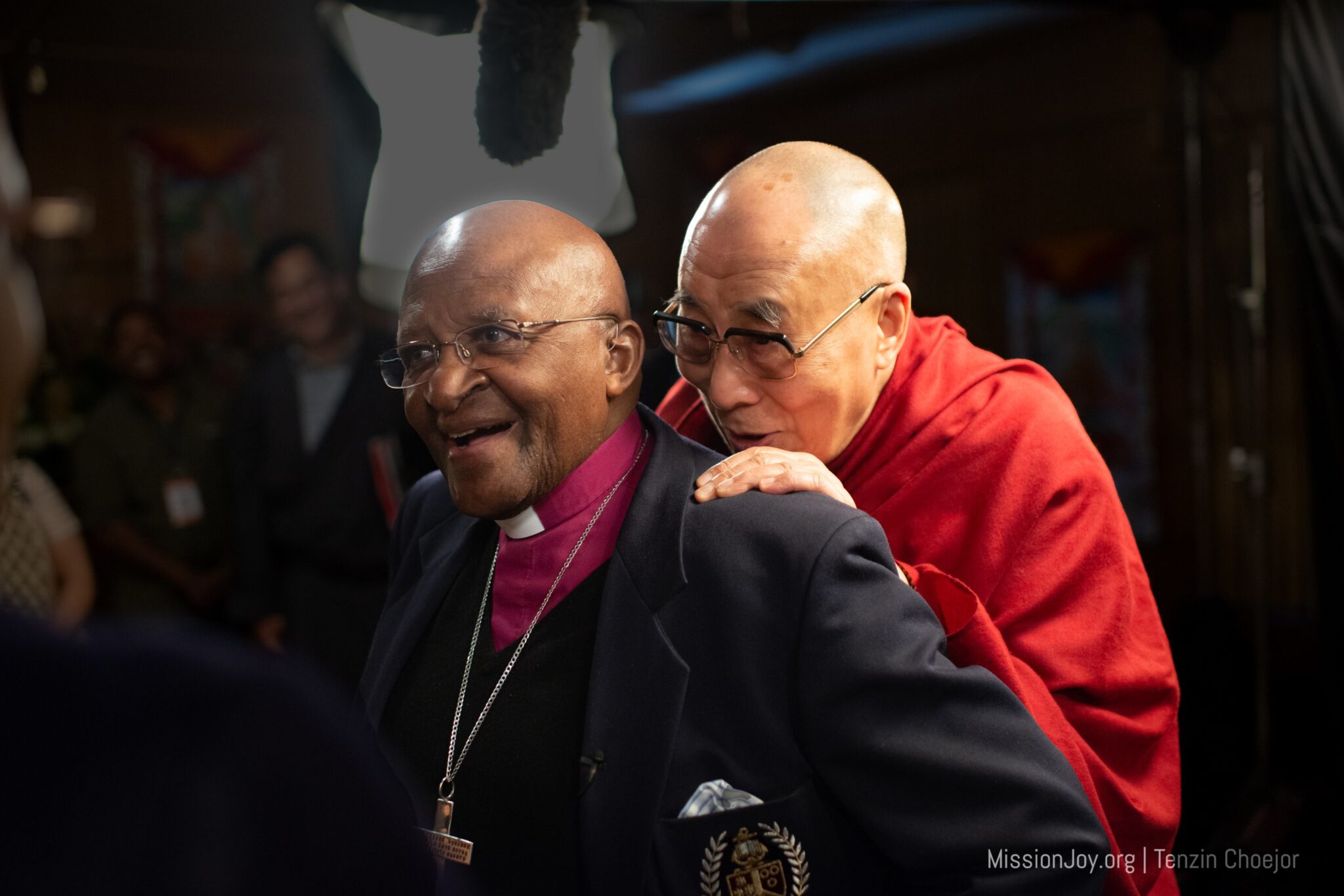Documentary film Mission Joy celebrates the friendship of two spiritual masters
In 2015, Archbishop Desmond Tutu traveled to Dharamsala, India. The purpose of his visit was to see a friend, His Holiness the Dalai Lama. For five days the two celebrated their decades-long friendship, teased each other like children, and pondered the link between joy and suffering.
The never-before-released footage from this visit comes together in Mission Joy, a documentary film that debuted at the Tribeca Film Festival in June 2021. The film captures two Nobel Prize Laureates during what is likely their final meeting—in this life, at least. But contrary to what one might expect, there’s nothing somber about these spiritual masters in conversation. Their banter is punctuated by silliness, thoughtful reflection, and tenderness.
Despite inhabiting different worlds and faith traditions—one an Anglican theologian renown for his fight against apartheid, the other a Buddhist monk and Tibet’s exiled spiritual leader—Desmond Tutu and the Dalai Lama are kindred souls. Both men are deeply spiritual. Both carry a history of struggle against authoritarian regimes. Both have oriented their lives toward compassion and care for others. But what seems to bond them most is a playful delight in the world. To each other, they are “mischievous brothers.”
At the outset of Mission Joy, Tutu muses that they have come together simply to “enjoy our friendship… and maybe talk about joy.” And talk about joy they did.
On the far side of suffering
For over fifty years, the Dalai Lama has lived in exile from his country of Tibet. The son of farmers, he was chosen as the next Dalai Lama at age two. He was raised by monks in the palace of Lhasa and handed political responsibility at age 16 when China invaded the country. At 24, he fled Tibet for Dharamsala, India, where he’s since dedicated his life to nonviolence and a peaceful Tibet. Despite living as a refugee for the majority of his long life, his primary countenance is one of deep contentment and compassion.
During one memorable conversation, Tutu turns to his friend and asks: “Why are you not morose? You’ve been in exile so long.”
“I personally prefer the refugee life,” the Dalai Lama responds. “It’s more useful. More opportunity to learn, more experience.”
Mission Joy highlights the two men’s juxtaposition of childlike joy against lives of great suffering and struggle. To them, this coexistence is not surprising or antithetical. Suffering, they explain, can lead us into joy. Suffering has the potential to widen compassion and deepen empathy. If joy is a life lived for others, as they believe, then suffering can be a gateway into that life. “The suffering,” explains the Dalai Lama, “is what makes you appreciate joy.”
For his part, Desmond Tutu grew up as far from a palace in Tibet as one can go. His childhood was beset by the poverty of South Africa’s townships during apartheid. While his father was loving when sober, he became abusive when drunk.
As an Anglican priest and theologian, the fight against racial oppression in South Africa became central to Tutu’s ministry. He traveled the world speaking out against his country’s injustice and was ultimately instrumental in dismantling apartheid. Later, he continued to bear witness to the darkest side of humanity through his participation in South Africa’s Truth and Reconciliation Commission.
Despite walking through decades of oppression and brutality with his fellow citizens, he has emerged on the far side of suffering with a deeper belief in humanity’s potential. “You can in fact overcome some of the most horrendous circumstances and emerge on the other side, not broken, with the eagerness to spread goodness and compassion in the world.”
The science of joy
Both men welcome scientific scrutiny of wisdom they have gleaned through their respective traditions and personal experience. The Dalai Lama’s academically rigorous Buddhist training led him to cultivate discussions with scientists for many decades. One of these scientists is Richard Davidson, whom the Dalai Lama invited to conduct neuroscientific research with Tibetan monks.
Long a researcher of pathologies, Davidson turned to kindness and compassion as a new area of study. He was particularly interested in cognitive reframing, a key feature in Buddhist psychology. Reframing the way we see the world and our circumstances can liberate us from resentment. This kind of reframing allows us to transmute loss into goodness, as the Dalai Lama did when he fled Tibet. In exile, he chose not to ask, “How can I be happy?” but rather, “How can I spread compassion and love?”
Through his research, Davidson discovered that wellbeing is a skill. It can be learned, nurtured, and cultivated, regardless of circumstances. Neuroscience confirms what the Dalai Lama and Desmond Tutu discovered through lived experience: that joy comes from within. Spiritual wisdom and science agree that the key to joy is living from a stance of compassion, connection, and kindness. Or in the words of Desmond Tutu, “Joy is the reward for seeking to give joy to others.”
Mission Joy is a manifesto for living lightly in dark times. Through laughter and conversation, the Dalai Lama and Desmond Tutu invite us to imagine joy as something communal—stemming from connection with and love for others—and compatible with suffering. This kind of joy, they remind us, can transform loss into compassion and injustice into reconciliation.
To learn more about the film and this extraordinary friendship, visit Missionjoy.org.
